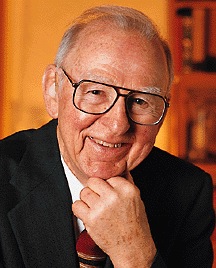Edwin G. Krebs facts for kids
Quick facts for kids
Edwin Gerhard Krebs
|
|
|---|---|

Edwin Gerhard Krebs
|
|
| Born | June 6, 1918 |
| Died | December 21, 2009 (aged 91) |
| Nationality | American |
| Alma mater | University of Illinois at Urbana-Champaign (B.S.), Washington University in St. Louis (M.D.) |
| Awards | Louisa Gross Horwitz Prize (1989) Welch Award in Chemistry (1991) Nobel Prize in Physiology or Medicine (1992) |
| Scientific career | |
| Fields | biochemistry |
| Institutions | University of Washington, Seattle University of California, Davis Washington University School of Medicine |
Edwin Gerhard Krebs (born June 6, 1918 – died December 21, 2009) was an American scientist. He studied biochemistry, which is the study of the chemistry of living things.
In 1992, he won the Nobel Prize in Physiology or Medicine. He shared this important award with his partner, Edmond H. Fischer. They won for explaining how a process called reversible phosphorylation works. This process acts like an on/off switch for proteins. It helps control many important things inside our cells.
It's easy to confuse Edwin Krebs with another famous scientist. Hans Adolf Krebs (1900–1981) also won a Nobel Prize. He discovered the citric acid cycle, which is a key part of how cells make energy.
Early Life and Education
Edwin Krebs was born in Lansing, Iowa. He was the third child in his family. His father, William Carl Krebs, was a Presbyterian minister. Because of his father's job, the family moved often.
They settled in Greenville, Illinois, when Edwin was six. They lived there until his father passed away in 1933. After this, his mother, Louise Krebs, moved the family to Urbana, Illinois. Edwin's older brothers were already attending the University of Illinois at Urbana-Champaign there.
Edwin went to Urbana High School. In 1936, he started at the University of Illinois. During his last year, he had to choose. He could either study organic chemistry or become a doctor. He received a scholarship to Washington University School of Medicine in St. Louis. So, he decided to study medicine.
He graduated in 1943. After that, he worked at Barnes Hospital in St. Louis for 18 months. Then, he joined the Navy as a medical officer.
In 1946, Krebs left the Navy. He couldn't go back to hospital work right away. He was told to study basic science instead. He chose to study biochemistry. He worked with famous scientists Carl and Gerty Cori. He studied how a protein called phosphorylase worked. After two years, he decided to continue his career as a biochemist.
Discovering Protein Switches
In 1948, Krebs became a professor at the University of Washington, Seattle. In 1953, another scientist, Edmond H. Fischer, joined the department. They decided to work together. They focused on how the enzyme phosphorylase works.
During their research, they made an amazing discovery. They found out how two forms of phosphorylase change into each other. This process is called reversible protein phosphorylation.
Think of it like a light switch for proteins. A special enzyme, called a protein kinase, adds a small phosphate group to a protein. This changes the protein's shape and can turn its function on or off. It can make the protein more active or less active.
Another enzyme, called a protein phosphatase, can remove the phosphate group. This turns the protein back to its original state. This on/off cycle controls many important processes in our bodies. It helps regulate how cells divide, change shape, and move.
When this process goes wrong, it can lead to diseases. These include serious conditions like cancer and diabetes. Fischer and Krebs won the Nobel Prize in 1992 for finding this important "switch" system.
Later Life and Legacy
Edwin Krebs enjoyed teaching and leading. He left the University of Washington for a while. He became the first head of the Biochemistry Department at the University of California, Davis.
In 1977, he returned to the University of Washington. He became the head of the Pharmacology Department. Krebs had some hearing loss later in his life.
Edwin Krebs passed away on December 21, 2009. He left behind his wife, Virginia, and three children. His work helped us understand how our bodies work at a tiny, cellular level.
See also
 In Spanish: Edwin G. Krebs para niños
In Spanish: Edwin G. Krebs para niños

